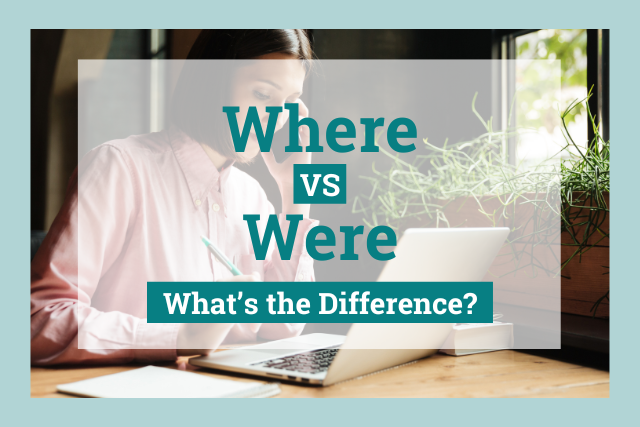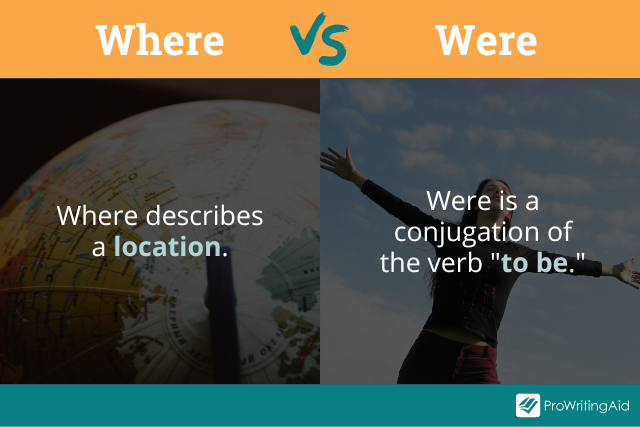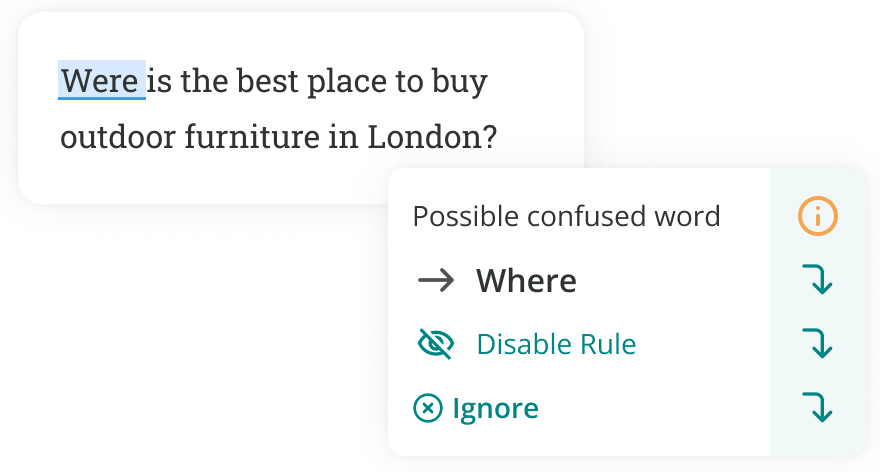Were and where are two words that are easily confused, even by native English speakers. They look similar, but they are spelled and pronounced differently, and they have very different meanings.
So, when should you use each word?
The short answer is that were is a past tense form of be, while where means “in a specific place.”
Read on to learn more about where vs were and how to use these words correctly in your writing.
What’s the Difference Between Where vs Were?
The most obvious difference between where and were is that where describes a location, while were is a conjugation of the infinitive verb to be.
Let’s look at the definition and meaning of each word in more detail.
Were Definition and Meaning
Were is one of the past tense forms of the verb to be.
We use were as the simple past tense form when writing in the second person singular: “You were snoring so loudly last night!”
We also use were as the past form of to be when writing in third person plural or first person plural: “They were happy to see you at the party yesterday,” or “We were thrilled to receive your letter last week.”
Finally, in addition to the simple past tense, we also use were to indicate the past subjunctive tense, which we use to express something hypothetical or imagined.
For example, you might write: “If I were an animal, I think I’d be a giraffe,” or “She greeted them as if they were old friends.”
Where Definition and Meaning
Where is a word that refers to a specific, unknown place.
When it is used in a question to ask about a place or location, it’s a question word that’s used as an adverb or pronoun. For example, you might ask, “Where is my pen?”
As a conjunction, where means in or at a specific place or time. For example, you might say, “The pen is right where you left it.”
Sometimes, we also use where to talk about a metaphorical place, rather than a literal one.
For example, you might say, “He annoyed me to the point where I left the room.” In this case, where doesn’t refer to a literal location, just a point in a process.
Where vs Were Examples in Sentences
The best way to learn spelling and grammar is through examples! Here are a few example sentences of each word from English literature.
Examples of Were in a Sentence
“Libraries were full of ideas—perhaps the most dangerous and powerful of all weapons.”—Sarah J. Maas, Throne of Glass
“All grown-ups were once children… but only few of them remember it.”—Antoine de Saint-Exupéry, The Little Prince
“If all else perished, and he remained, I should still continue to be; and if all else remained, and he were annihilated, the universe would turn to a mighty stranger.”—Emily Brontë, Wuthering Heights
“So I walked back to my room and collapsed on the bottom bunk, thinking that if people were rain, I was drizzle and she was a hurricane.”—John Green, Looking for Alaska
“The Karands were a warlike race with little patience for cultural niceties.”—David Eddings, Demon Lord of Karanda
“I hate to hear you talk about all women as if they were fine ladies instead of rational creatures. None of us want to be in calm waters all our lives.”—Jane Austen, Persuasion
“We were five. You had on a red plaid dress and your hair… it was in two braids instead of one. My father pointed you out when we were waiting to line up.”—Suzanne Collins, The Hunger Games
Examples of Where in a Sentence
“I may not have gone where I intended to go, but I think I have ended up where I needed to be.”—Douglas Adams, The Long Dark Tea-Time of the Soul
“It isn’t what you have or who you are or where you are or what you are doing that makes you happy or unhappy. It is what you think about it.”—Dale Carnegie, How to Win Friends and Influence People
“Be with me always—take any form—drive me mad! only do not leave me in this abyss, where I cannot find you! Oh, God! it is unutterable! I can not live without my life! I can not live without my soul!”—Emily Brontë, Wuthering Heights
“But mostly, as much as I hate it, I can sense where the Thrall are.”—C.T. Adams and Cathy Clamp, Touch of Darkness
“Books say: She did this because. Life says: She did this. Books are where things are explained to you; life is where things aren’t. I’m not surprised some people prefer books.”—Julian Barnes, Flaubert’s Parrot
“The result was sloping tiled floors where an errant step up would meet three steps down.”—Christine Barber, The Replacement Child
“It’s a dangerous business, Frodo, going out your door. You step onto the road, and if you don’t keep your feet, there’s no knowing where you might be swept off to.”—J.R.R. Tolkien, The Lord of the Rings
How to Remember When to Use and Spell Where vs Were Correctly
There are several different tricks you can use for remembering how to spell where vs were correctly.
Because where and were sound different when spoken, one way to remember the difference is to focus on the pronunciation.
Where rhymes with there. Were rhymes with fur. It’s a good idea to read your sentence out loud to see if you are using the correct word.
Another useful mnemonic for remembering the difference is to notice that where has an h for home, and home is a place. Therefore, if you’re writing about a place, you should use where with an h.
Finally, if you’re not sure you’re using the right word, you can always run your writing through ProWritingAid, which will catch tricky misspellings like “were are you” or “you where over there”!
Take your writing to the next level:
20 Editing Tips from Professional Writers
Whether you are writing a novel, essay, article, or email, good writing is an essential part of communicating your ideas.
This guide contains the 20 most important writing tips and techniques from a wide range of professional writers.

Fact-checked by
Paul Mazzola
Differences between where and were
The differences between where and were are the pronunciation, spelling, and meaning. One is always a verb; one is an adverb and part-time subordinating conjunction. They are two different words and have different meanings.
Where definition
Where can be an adverb or, informally, a subordinating conjunction linking dependent and independent clauses.
As an adverb that usually appears after a place or situation. It means in, at, or to which, as with a sentence like “I lived in New York City, where I worked for several years.”
Where in a sentence
Here are sentences using the word «where» to show in, at, or to which:
-
“She studied in London, where she became a master art restorer.”
-
“To which address is the envelope going? Where are you sending it?”
-
“I live at the intersection of Smith and Vine Streets. I live where the two roads cross.”
Where can also be used as a subordinating conjunction as with:
Here the meaning of where is “in which.”
Where as a conjunction can also mean “in the place that,” or “in situations that,” as with these sentences:
-
“Where the rubber meets the road, we separate the adults from the children.”
-
“Where the desert offers no visible water, animals inventively dig.”
-
“We hid our treasure where no other pirates could find it.”
Where is pronounced to rhyme with bear, hair, or there.
Were definition
Were is a verb form of to be, and it is three different verb forms:
-
second-person singular past tense – “You were in line first.”
-
plural past tense – “They were miners.”
-
past subjunctive tense – “If I were in his shoes, I would have done the same thing.”
Were is pronounced to rhyme with burr and stir.
Let’s review the word «were» in its three different verb forms and learn how to use «were» in sentence.
Were in a sentence
The second-person singular past tense refers to using were for the singular second-person pronoun you, or when referring to another person (only one) by name. Here are sample conversation using the past tense of the verb were:
You: “Bettine, were you in the post office yesterday?”
Bettine: “Yes. I was mailing a box of llama chow. Why, were you there too?”
You: “You were in line ahead of me. Were you aware I was there or was I where you could not see me?”
Bettine: “I was not aware. Were you where the line turned around the pillar?”
The plural past tense of to be is were. This plural form is used for all plural noun forms, such as we and they.
You: “Together, we were in the post office an hour.”
Bettine: “My coworkers were wondering where I was.”
You: “The postal workers were sorting and canceling as fast as they could.”
Bettine: “They really were, but I was still late getting back, where my boss was upset.
The past subjunctive tense is reserved for any hypothetical or unreal event in the past, present, or future. If it is unlikely to happen or cannot happen at all, use the past subjunctive tense:
Bettine: “Were I to suddenly sprout wings, I would not be able to get back to the office in time.”
You: “It was as if time were moving backward, standing in that line.”
Bettine: “If I were a less patient person, I would throw a loud tantrum.”
You: “Suppose we were to bring sandwiches and have a picnic in the line next time!”
Bettine: “It would be as if we were completely free for the afternoon.”
When to use where or were
Now that we see that where is an adverb or sometimes a subordinating conjunction, and were is always a verb, we should have no trouble sorting out when to use which word.
We always use were when we need a verb or a helping verb:
-
We were happy children.
-
They were playing in the snow.
-
You were experimenting with buoyancy.
-
You and I were floating pennies on saltwater.
-
Were I able to turn back time, I would go back to my eighth birthday.
-
If I were you, I would review my notes for that test.
We use where to mean location, as with at, in, or to which:
-
Where would you like the llama sent?
-
Where did you put the llama’s leash?
-
The llama goes into the paddock, where she eats alfalfa.
-
The actor moved to Los Angeles, where he starred in a llama drama.
-
Antarctica is a land where llamas are ill-suited for travel.
We also use where as a conjunction:
-
This is the time in the movie where the hero rides a llama.
-
Where I go, no llama should follow.
-
Where the hard rains fall, there you will find llamas.
Where vs. were examples
See how well you can separate where and were by completing these example sentences.
Put where or were in the correct blanks in these sentences:
-
“There, _______ the river bends to the north, is the best place to cross with the llamas.”
-
“_______ I a honey badger, I could live a life of ease.”
-
“_______ I see hard work and long days ahead, you see the carefree life of a llama farmer.”
-
“When _______ you going to tell us about the llama farm?”
-
“It was as though she _______ going to jump over that fence and escape.”
If we were you, we would try before we looked at the answers.
-
“There, where the river bends to the north, is the best place to cross with the llamas.”
-
“Were I a honey badger, I could live a life of ease.”
-
“Where I see hard work and long days ahead, you see the carefree life of a llama farmer.”
-
“When were you going to tell us about the llama farm?”
-
“It was as though she were going to jump over that fence and escape.”
Were vs. we’re
The word we’re is another English word that gets confused with were. It is pronounced the same way and looks like the word were with an apostrophe.
We’re is the conjunction of the pronoun we and the plural present tense form of the verb to be, are.
The words «were,» «we’re,» and «where» are easily confused because they have similar sounds and spellings. They are not homophones—words that have the same sounds or spellings—and their meanings and uses are quite different. «Were» (rhymes with «fur») is a past form of the verb «to be.» «We’re» (rhymes with «fear») is a contraction of «we are.» The adverb and conjunction «where» (rhymes with «hair») refers to a place.
How to Use Were
Use «were» as a past tense verb, as the:
- First-person plural of «be» (We «were» busy last week.)
- Second-person singular and plural of «be» (You «were» busy last week.)
- Third-person plural of «be» (They «were» busy last week.)
- Subjunctive of «be» for all persons (If I «were» you, I’d demand a raise.)
How to Use We’re
Since «we’re» is a contraction for «we are»—and in rarer cases «we were»—simply use «we’re» when you want to write or say a shorter version of the first-person plural pronoun «we» and to be verb «are.» The apostrophe replaces letter «a» (for «we are») or the letters «we» (for «we were, though that use is much less common). For example:
- «We’re» going back to work tomorrow.
In this sentence, which is perfectly acceptable English, you are saying: «We are» going back to work tomorrow.
How to Use Where
Use «where» as an adverb referring to a location, as in:
- I don’t know «where» you live.
Here, the writer is stating that she does not know «where» (at what place or location) the listener or reader lives. This word is also often used to start a question, such as:
- «Where» do you live?
In the sentence, the speaker is trying to find out at what location the listener or reader lives. Often, the person speaking (or even writing, as in a letter or email), is trying to find the exact address where the person resides.
How to Remember the Differences
To determine the difference between «were» and «we’re,» try substituting «we are» for the word. If it works, you know you can use «we’re.» If it doesn’t, you need «were.» For example, take the sentence:
- «We’re» going to the movies.
You could swap in «we are» for «we’re,» and the sentence still makes sense:
- «We are» going to the movies.
However, if you replace «were» for «we are,» the sentence does not work:
- «Were» going to the movies.
If you read the sentence aloud, your ear might tell you that the sentence lacks something. Indeed, it does: Since «were» is a past form of «to be,» you are lacking a subject. The sentence would work if you added in the word «we,» as in:
- We «were» going to the movies.
When trying to determine the difference between «were» and «we’re» versus «where,» remember that «were» and «we’re» are both «to be» verbs, or at least contain a «to be» verb; whereas, «where» always refers to a location. So, use the terms at the end of each sentence, as in:
- You live «were?» (This is the past form of «are.»)
- You live «we’re?» (This actually means: You live «we are?»)
Both of these uses don’t make sense. However, if you say:
- You live «where?»
That sentence works, because you are ending the sentence with the location word, «where.» To further clarify, swap out «where» with a location:
- You live in California?
- You live upstairs?
- You live in Europe?
- You live where?
Remember this trick, and you’ll never confuse «where» for «were» and «we’re.»
Examples
To understand examples, simply apply the above rules and tricks to create sentences making up a brief narrative.
- We’re going to Savannah for St. Patrick’s Day.
This sentence means «we are» going to a particular location, Savannah. The word «we’re» contains the subject of the sentence, «we,» as well as a verb «are.»
- But, we don’t know where we’ll be staying.
In this case, the term «where» refers to a location—or more specifically, the lack of a location. The writer/speaker does not know in what location his group will be staying.
- Last year we were forced to sleep in the van.
In this sentence, the speaker describes a past action—last year—when the group (sans a location to stay) had to sleep in a vehicle. The following sentence—and the end of this brief narrative—uses all three terms:
- We were lost in the middle of Timbuktu. No one knew where we were. Next time we travel, we’re going to bring along a map.
In the first bolded word, the group (in the past) was lost. Therefore, no one knew «where» (the location) we «were» (past tense of «are»). Switching to the present, the writer notes that in the future, «we’re» (we are) going to bring a map.
Sources
- » Common Errors in English Usage: Were / Were.» Washington State University.
- «Commonly Confused Word, were, we’re, where.» Online Writing Support/Townson University.
- Shrives, Craig. “Wear, Were, We’re, and Where.” The Difference between Wear, Were, We’re, and Where (Grammar Lesson). Grammar-monster.com.
Write a sentence for each word/phrase.
1. (at the moment)
2. (on Sundays)
3. (in the summer)
4. (always)
5. (right now)
6. (in the winter)
7. (never)
reshalka.com
Английский язык 5 класс (рабочая тетрадь) Ваулина. 7 Grammar Practice. Номер №3
Решение
Перевод задания
Напишите предложение для каждого слова / фразы.
1. (на данный момент)
2. (по воскресеньям)
3. (летом)
4. (всегда)
5. (прямо сейчас)
6. (зимой)
7. (никогда)
ОТВЕТ
1. (at the moment) I am doing my homework at the moment.
2. (on Sundays) We go swimming in the swimming pool on Sundays.
3. (in the summer) We go camping in the summer.
4. (always) I always help my mother in the kitchen.
5. (right now) My sister is having a picnic right now.
6. (in the winter) My dad goes skiing in the winter.
7. (never) My sister never walks our dog.
Перевод ответа
1. (в данный момент) Я сейчас делаю домашнее задание.
2. (по воскресеньям) По воскресеньям купаемся в бассейне.
3. (летом) Летом ходим в походы.
4. (всегда) Я всегда помогаю маме на кухне.
5. (прямо сейчас) Моя сестра сейчас на пикнике.
6. (зимой) Папа зимой катается на лыжах.
7. (никогда) Моя сестра никогда не выгуливает нашу собаку.
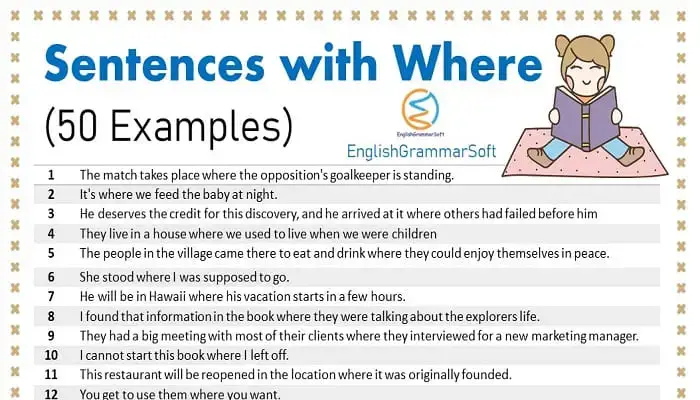 Pin
Pin
Where is used as an adverb, meaning “at which place”. However, it can also be used as a conjunction or pronoun. Here are 50 example sentences with where.
- The match takes place where the opposition’s goalkeeper is standing.
- It’s where we feed the baby at night.
- He deserves the credit for this discovery, and he arrived at it where others had failed before him
- They live in a house where we used to live when we were children
- The people in the village came there to eat and drink where they could enjoy themselves in peace and quiet all day long.
- She stood where I was supposed to go.
- He will be in Hawaii where his vacation starts in a few hours.
- I found that information in the book where they were talking about the explorers life.
- They had a big meeting with most of their clients where they interviewed for a new marketing manager.
- I cannot start this book where I left off.
- This restaurant will be reopened in the location where it was originally founded.
- You get to use them where you want.
- You shouldn’t let the dog get in where it shouldn’t.
- I wanted to know where you were.
- I don’t like the sound where the footsteps are coming from.
- The children used to play where the swings are now.
- This is the place where I like to go for coffee.
- This is the place where he met his wife
- We need to go there where they are having the sale.
- The garage where I work is located in a pretty suburb.
- If you want my opinion, it’s where my heart is.
- The protagonist didn’t know where they were headed.
- I would like to find out who put it where it is now.
- I looked where I had left it and it wasn’t there anymore.
- The boat sank where the river got shallow.
- The dog made a mess where he had been eating his food.
- I swear where you’re going to party tonight is the bomb!
- Where she lives, there aren’t many jobs available for workers like her.
- Where are you from?
- Where is the nearest station?
- Where can I park?
- Where should I go for dinner?
- Where are you staying?
- Where do you want to go?
- Where should I put my umbrella?
- Where were the phones made?
- Where is your hometown?
- Where are your grandparents from?
- Where have you traveled before?
- Where will you stay in Maine?
- Where will you find accommodation this summer?
- Where would you like to go on vacation?
- Where would you really like to visit this year?
- Where can I buy tuna?
- Where is my bookbag?
- Where do I go on Fridays?
- Where is my dog carriage?
- Where is your car? It’s parked outside the library.
- Where is his house? He lives near the beach.
- Where are the new cars being sold?
- Where can I buy some new t-shirts, please?
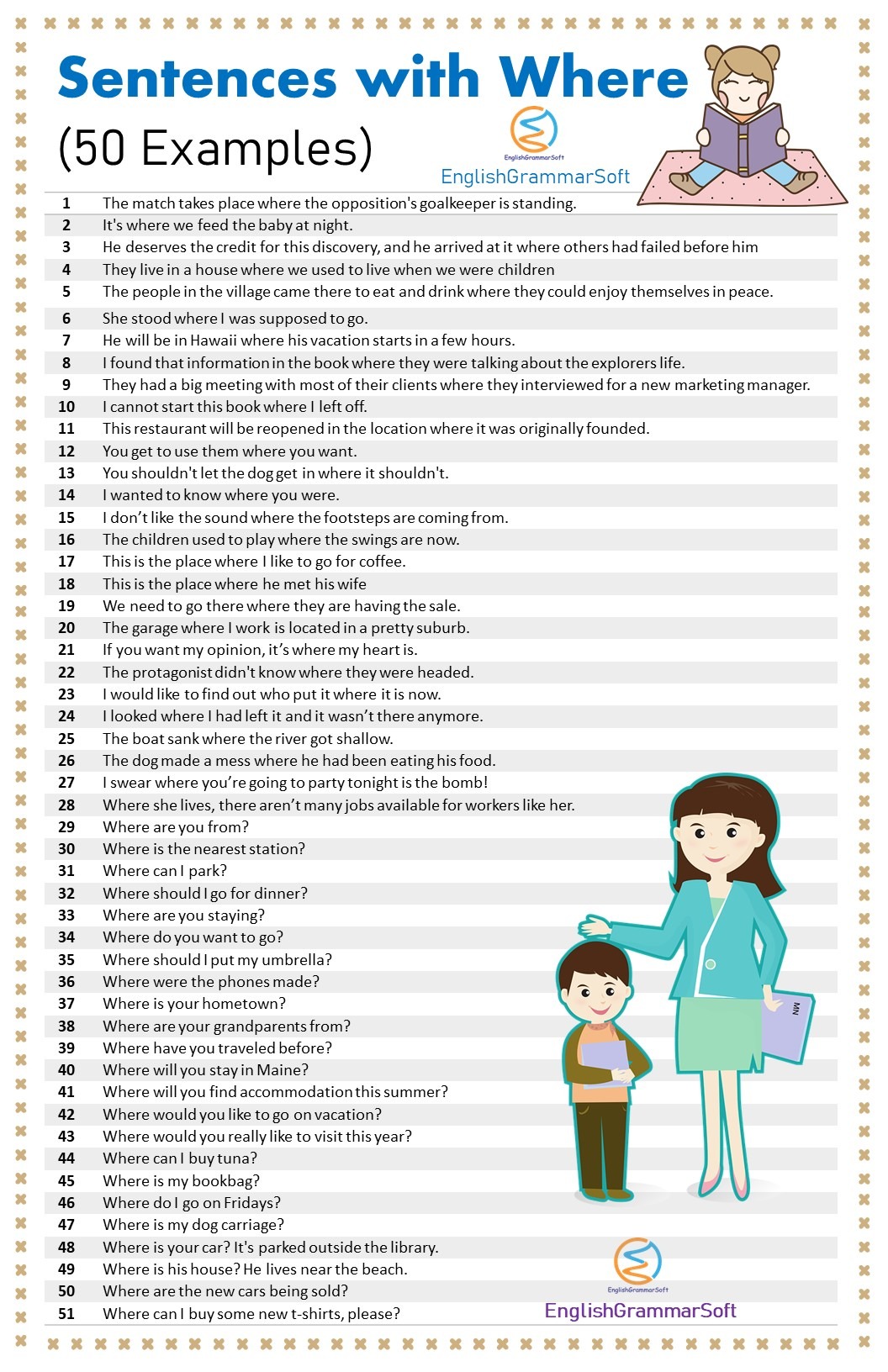
Read also
- Conjunction Sentences (50 Examples)
- Sentences with Although Conjunction (87 Examples)
- Sentences with Because Conjunction (50 Examples)
- Sentences with But Conjunction (75 Examples)
- No Sooner Than Sentences (31 Examples)
- Examples with Neither Nor (50 Sentences)
- Sentences With Semicolons (;) 50 Examples
- Sentences with Either – or
- 50 Example Sentences with However
- Do Does Did Sentences (50 Examples)
- Has Have Had use in sentences | 50 Examples
- Was Were Sentences | 50 Examples
- There is – There are Sentences | 50 Examples
- Is am are sentences in English (50 Examples)

